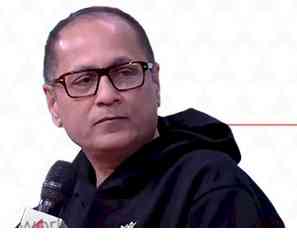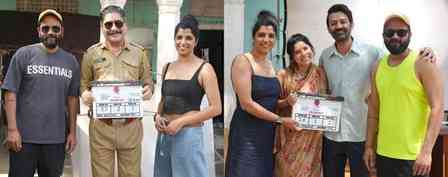‘Backing films like The Kerala Story is essential for filmmakers' integrity’, says Film Producer & Director Vipul A Shah at Ideas of India Summit 3.0
In a key session at Ideas of India Summit 3.0, Bollywood Film Producer and Director Vipul A Shah who is also known for the much discussed, The Kerala Story, shared his perspective on the changing landscape of Indian Entertainment Industry. “The rise in political consciousness among Indians has significantly influenced the content of films we make and the stories we tell. Supporting films like 'Kerala Story' is important, it speaks to the filmmaker's integrity and the importance of diverse voices and narratives,” he said.

Mumbai, February 23, 2024: In a key session at Ideas of India Summit 3.0, Bollywood Film Producer and Director Vipul A Shah who is also known for the much discussed, The Kerala Story, shared his perspective on the changing landscape of Indian Entertainment Industry. “The rise in political consciousness among Indians has significantly influenced the content of films we make and the stories we tell. Supporting films like 'Kerala Story' is important, it speaks to the filmmaker's integrity and the importance of diverse voices and narratives,” he said.
Vipul Shah, further remarked, ‘As individuals with political leanings, our religious practices should not be misconstrued as communal. It is a fundamental aspect of personal identity.’
On the inaugural day of ABP Network’s flagship event, the ‘Ideas of India’ Summit 3.0, celebrated filmmakers shared their views on ‘Anatomy of Art: Are Our Movies Dividing or Uniting Us?’ shedding light on controversial topics and the quest for authenticity in storytelling.
Explaining the complexities within the Indian film industry, Vipul A Shah, expressed, “Despite perceptions of division, the film industry remains a complex ecosystem, where narratives often become politicised. Today, the success of a film hinges not on its controversy, but on its ability to resonate with audiences through genuine, thought-provoking content. Projects like 'Animal' challenges societal norms and sparking important discussions. It is through daring, unconventional narratives that we provoke change and global influence.”
Sharing his take on whether polarizing movies are a recent trend, Madhur Bhandarkar, Filmmaker, Producer and Script Writer, remarked, “There is no division in the film industry; it remains unified, despite varied political and non-political leanings. While some artists are open and vocal, others choose discretion, a natural aspect of the industry. My films, like 'Chandani Bar, Traffic signal etc.,' have addressed issues like poverty and have always maintained a secular stance. However, my personal political alliance led to sidelining and questioning of my secularism. I am a proud practicing Hindu. Our films consistently promote unity between Hindu and Muslim communities. The success of films like 'Animal' has revolutionized industry norms, despite controversies surrounding their content. However, actors often hesitate to endorse politically charged projects due to fear of social media backlash and its repercussions on their careers.”
Known for movies like Parched and OTT series ‘House of Secrets’, Leena Yadav, Filmmaker and Storyteller, put forth a women’s perspective, stating, “Films cannot be made without politics. The lack of real dialogue between filmmakers is missing, and the social media is creating pressure for people to take action. It is impossible for makers not to include their political bias. Films are driven by commerce, and sentiment-driven cinema is becoming a part of mainstream and social media discussion. There are films with controversial angles which get financing and not all of them are made with conviction.”
The ABP Network’s ‘Ideas of India’ Summit 3.0 spotlighting the ‘The People’s Agenda’ brought a confluence of ideas and ideators to a common platform celebrating the country’s people and its plurality. The two-day summit hosted policymakers, cultural ambassadors, industry experts, celebrities, business leaders, economists, and leading luminaries to delve into the fundamental ideas of liberty, justice, equality, and diversity that define India, its society, culture, and politics. The meaningful deliberations on diverse topics had the brightest minds across sectors providing insights about the nation's trajectory and its journey to become Viksit Bharat.


 City Air News
City Air News 










